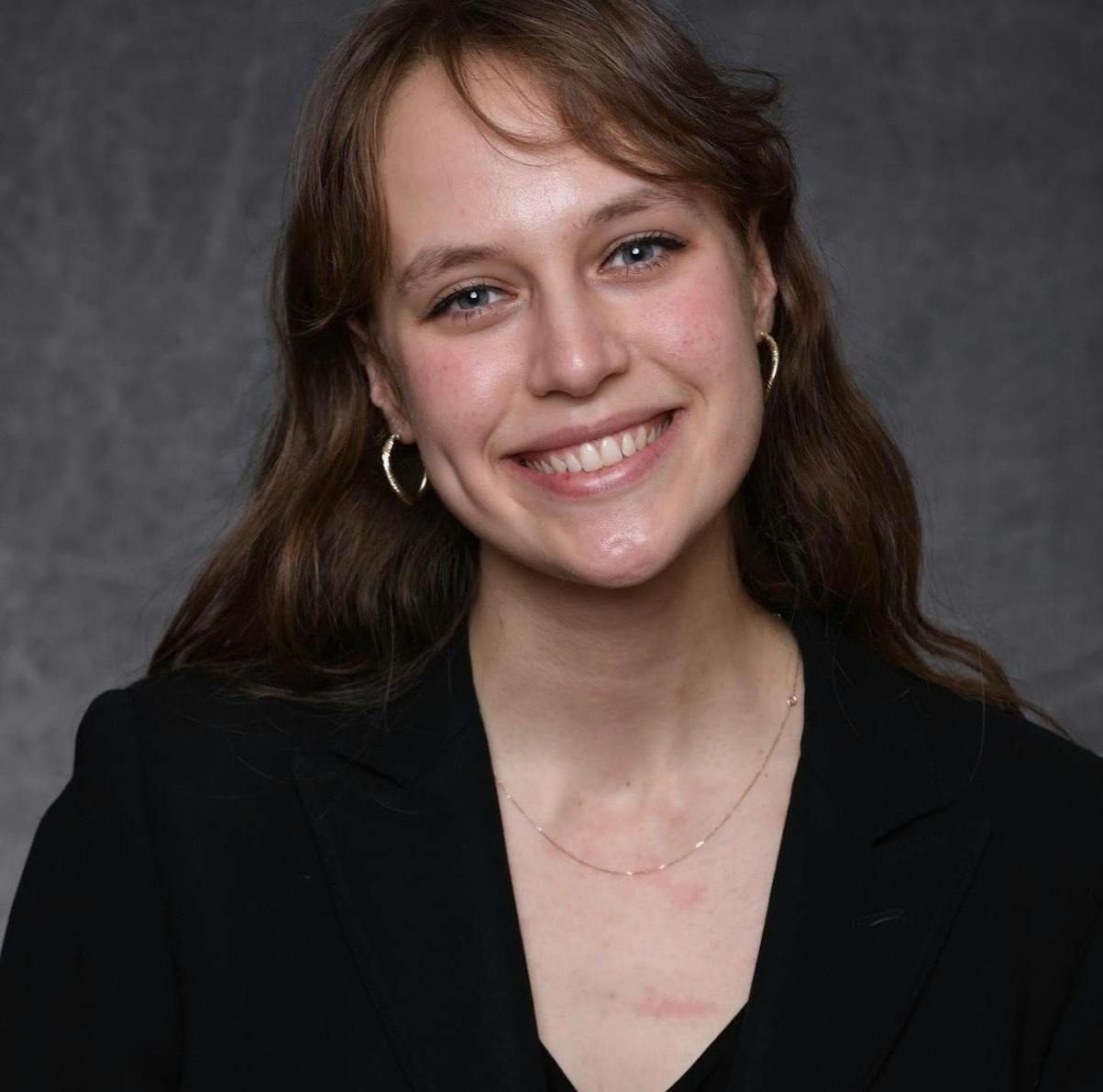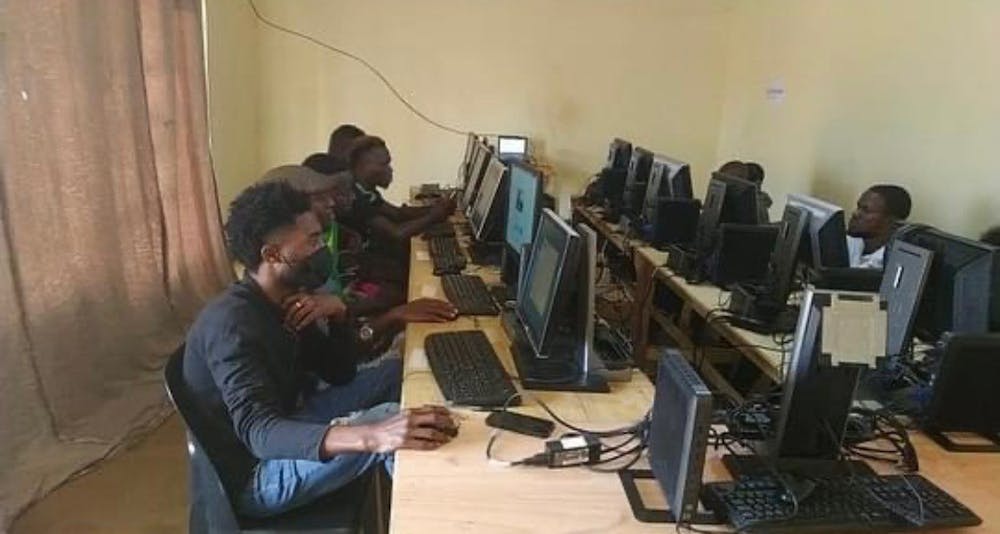From Malawi to Mount Pleasant: Nearly two dozen students take virtual CMU classes from refugee camp
Thousands of miles away from Mount Pleasant, 20 students in a refugee camp Dzaleka, Malawi, connect to Central Michigan University.
The Refugee Outreach Collective (ROC), a non-profit organization, collaborated with CMU two years ago to create the Global Classroom. This semester CMU waived tuition for 20 students who are forced migrants in Dzaleka. Emily Worline, one of ROC's founders said the final goal is a formal college degree.
Richard Rothaus, dean of the College of Liberal Arts and Social Sciences said CMU has never done anything like this before.
“It's a very ambitious project,” Rothaus said. “The goal is to help people work through the certificates, associates degrees, maybe get someone to a bachelor's degree. … It's not easy, but it's possible.”
Rothaus said that the initiative would not be possible without ROC.
What is ROC?
Worline said ROC is a nonprofit organization that works with universities to offer educational resources for people who experienced forced displacement.
According to Worline, ROC has nine student organizations on campuses in Michigan, Ohio and Wisconsin. Each chapter has its own program such as tutoring, helping with working permits and funding medical relief.

Courtesy of Emily Worline.
Tyler Zimmerman is the president of ROC's chapter at CMU. He said ROC at CMU holds fundraising events, does clothing drives, hosts speakers and holds simulation activities on campus, like one that simulated what it is like to be a migrant.
“ROC is really focused on advocating for refugee-friendly policy, as well as educating the CMU community about issues that these forced migrants face,” Zimmerman said.
ROC meets at 5:30 p.m. every Tuesday in hosted 52,678 forced migrants as of December 2021. Migrants were fleeing from the Democratic Republic of the Congo, Burundi and Rwanda. The monthly average of new arrivals is 300 people.
“Things in Dzaleka are bad,” Rothaus said. “It used to be, in Dzaleka, years ago … the UN would give them like $5 a month, and that's what they would live off. But the level of recognition the camp gets has dropped, so now they just get bags of corn. That's the level of poverty that people in Dzaleka are dealing with.”
Prakash Adhikari is a political science faculty member at CMU, who teaches courses to Dzaleka students and advises the ROC chapter at CMU.
Adhikari said that people spent many years in Dzaleka while waiting for the recognised status of a refugee within United Nations High Commissioner for Refugees (UNHCR). Adhikari also said the accurate term for people in this situation is “forced migrants” rather than “refugees” which victimizes people.
Worline and Adhikari worked on the Global Classroom together, Adhikari said.
How ROC began
Worlines said she was a freshman in Kalamazoo College when she started ROC. She went to Greece, where she saw many forced migrants, and thought they were in an “awful” situation.
When she came back to the United States, Worline connected with resettlement agencies -- the organizations that assist migrants when coming to the U.S. She asked the agencies in Michigan what was their biggest need. It was furniture.
“I organized a furniture drive and really quickly students started working with me and we filled all of the homes of people that they were resettling at that time,” Worline said.
At that point, Worline said, many students wanted to help forced migrants more. She connected with people from different campuses to start ROC student organizations.
Worline said ROC chapters were first established in Kalamazoo College, Western Michigan University and Michigan State University. Other colleges, like CMU, had student organizations merge or rebrand to become ROC.
CMU had a student organization meant to help forced migrants, that was started by Adhikari about five years ago. It was called Student Advocates for Forced Migrants.
Adhikari also taught a course on refugees and forced migration. One day after class, he said, his students approached him wanting to learn more and do something outside of the class.
Zimmerman said he first saw the RSO at MainStage.
“The table caught my eye and I've always felt drawn to service, so helping refugees gain access to education sounded like it was right up my alley,” Zimmerman said.
This year, he became president of ROC’s CMU chapter.
In 2020, Worline went to Malawi to volunteer. In a refugee camp, she saw a need for education that inspired her for a Global Classroom program.
According to ROC’s website, only 5% of migrants have access to post-secondary education.
Adhikari said in 2020, when classes switched to online, he saw an opportunity to ask CMU to make it possible for students in Dzaleka to attend classes remotely.
Adhikari said he approached Rothaus to ask if it was possible.
Rothaus said he informed President Bob Davies about ROC and the Global Classroom initiative. From then on, CMU started welcoming students from Dzaleka to classes.
This year, CMU signed an official contract with ROC, Adhikari said.
Rothaus said because of poverty in Dzaleka and students being unable to afford classes, CMU waived tuition for 20 students. Rothaus said that the Global Classroom is coordinated carefully, and students are able to take only those courses that have free space.
“It doesn't actually cost a penny (to CMU),” Rothaus said. “Because it's so tightly constrained, it's hand-chosen, carefully curated classes, (and there is) space available so they can't log in and bump someone out of an engineering class.”
Dzaleka students studying at CMU
Worline said ROC recruits students “on the ground in Dzaleka” through the application process. She said students submit their letters of interest, answer questions and then do interviews with ROC staff. Then, ROC submits the students' names to CMU.
Worline said students must have a minimum of a high school diploma or comparable Malawian state exams. She said the selection process is competitive. There are more people interested than spots available.
Adhikari said students attend classes remotely or watch recorded lectures in the ROC center in Dzaleka, which is equipped with computers, Wi-Fi and everything students need to work.
Worline said students are graded and treated like any CMU student in Mount Pleasant. She said this semester, students have the opportunity to meet teaching assistants during office hours.
Worline said it will take students in Dzaleka three years to complete the necessary amount of credits for an associates degree because they are taking one or two classes per semester. She said the classes are work independent study credits, which means the amount of credits varies on the amount of work assigned. Worline said in summer, students will be able to take courses worth regular credit which depends on a course.
Worline said later her goal is to transfer credits Dzaleka students earned from CMU to a community college that would grant students an associates degree.
Rothaus advises students in Dzaleka to go into entrepreneurship, computers or social work, because those field would be helpful for their future.
“They're very smart and they're figuring out ‘what can I do while I'm still in a camp?’“ Rothaus said. “There's small businesses in a camp. There's a whole camp economy. There's endless social needs, social work. ... Much of what happens in business happens on cell phones, so computer science, that makes sense.”
Rothaus said students have already taken and are taking political science, and French and English Language Institute courses. Adhikari teaches three of the political science courses.
Adhikari said Dzaleka students are “very hungry to learn.” He said the students are active in class and frequently ask questions.
"When you're providing an opportunity for (Dzaleka students) to take class alongside CMU students, college students, their excitement is over the roof,” Adhikari said.
Adhikari said domestic students also benefit from having encamped students in their class. He said domestic students enjoy the experience and they all form friendships.
“When they were taking my class, they were doing study sessions, they were exchanging notes, and … they shared their phone on WhatsApp, (and) other ... social media,” Adhikari said.
Rothaus said such connections “make the world a better place.”
“It's good for our students to know that there's a bigger world out there,” Rothaus said.
Challenges and future plans
Rothaus said the work in Dzaleka can be hard.
“The only computers are in the little school house study area that ROC has built and maintains," Rothaus said. "ROC finds (students) notebooks, finds them pencils, pays for the internet connection. … It’s a huge challenge.”
Adhikari said internet connection in Malawi is some of the most expensive in the world. He said ROC pays about $75 per month for internet.
The other challenge, Adhikari said, is the inconsistent electricity that often stops working.
The seven-hour time difference also adds difficulties. Students take early morning classes because it is not safe to be out in the refugee camp at night, Adhikari said.
Rothaus said the students there can speak in English but have trouble writing in it.
“The good news is they do all the reading and they have lots of questions,” Rothaus said. “But because some days the internet doesn’t work and they don’t have access to all the same materials we do, it takes a little bit of creating (and) adapting assignments.”
Adhikari said he meets students outside of class virtually on Fridays to help them learn the material and overcome language barriers.
Rothaus said he wants to diversify the classes that CMU offers the students in Dzaleka. So far, students can take liberal arts and social science courses, but Rothaus said he hopes to expand the course offerings to include business and computer science classes.
At the end of the day, Worline said, the main goal of the program is to give a dreamed degree to Dzaleka's students.
“It’s more the cause that I try and keep my focus on,” Worline said. “Unfortunately, more and more people are going to be displaced every year, with global climate change and more and more countries having exclusionary policies. … I remind myself of that, and that's what keeps me working.”
Rothaus said when working on the program, he remembers the “starfish story."
In it, a young boy is at the beach throwing starfish back into the water to keep them alive. A passerby questions him, saying that there are miles of beach, hundreds of starfish and he will not make a difference. The boy proceeds to throw another starfish in the water and responds, "I made a difference to that one."
“I think about that all the time,” Rothaus said. "We can't do anything about the political situation in Congo or Malawi ... but this is something we can do."
“I believe in the power of education to improve forcibly displaced persons' lives," Adhikari said. "It's rewarding. If I am able to improve someone's life through education, at the end of the day, I'll feel good."







